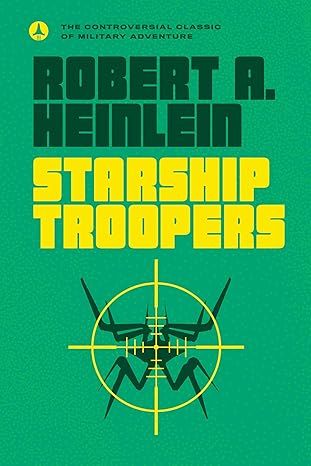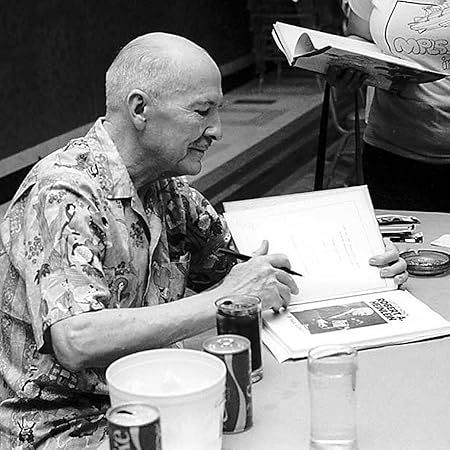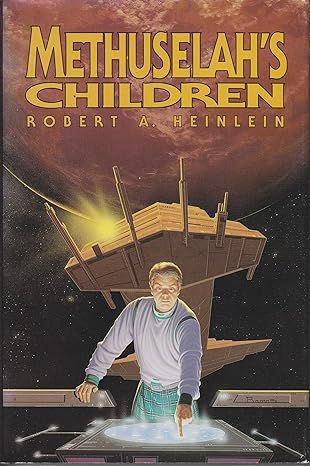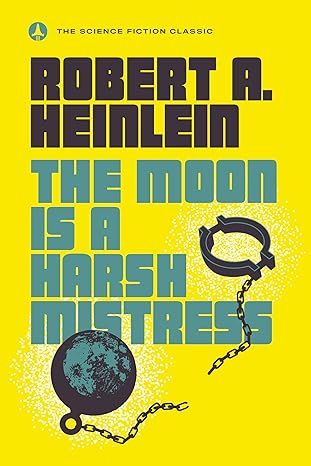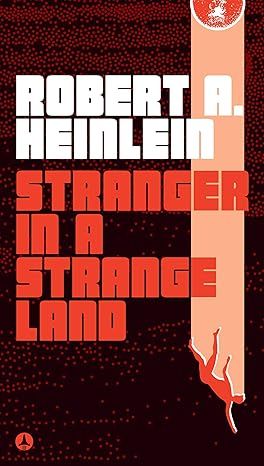Starship Troopers
4.5 out of 5
18,598 global ratings
In Robert A. Heinlein’s controversial Hugo Award-winning bestseller, a recruit of the future goes through the toughest boot camp in the Universe—and into battle against mankind’s most alarming enemy...
Johnnie Rico never really intended to join up—and definitely not the infantry. But now that he’s in the thick of it, trying to get through combat training harder than anything he could have imagined, he knows everyone in his unit is one bad move away from buying the farm in the interstellar war the Terran Federation is waging against the Arachnids.
Because everyone in the Mobile Infantry fights. And if the training doesn’t kill you, the Bugs are more than ready to finish the job...
“A classic…If you want a great military adventure, this one is for you.”—All SciFi
288 pages,
Kindle
Audiobook
Hardcover
Paperback
Audio CD
First published June 26, 2006
ISBN 9780441014101
About the authors
Robert Heinlein
Robert Heinlein was an American novelist and the grand master of science fiction in the twentieth century. Often called 'the dean of science fiction writers', he is one of the most popular, influential and controversial authors of 'hard science fiction'.
Over the course of his long career he won numerous awards and wrote 32 novels, 59 short stories and 16 collections, many of which have cemented their place in history as science fiction classics, including STARSHIP TROOPERS, THE MOON IS A HARSH MISTRESS and the beloved STRANGER IN A STRANGE LAND.
Read more
Reviews
The Kekistani
5
Riveting
Reviewed in the United States on September 26, 2024
Verified Purchase
It was as good as I exoected it would be. Definitely a must read if you loved the movie and play Helldivers and Spacemarine.
Bill
5
Good read
Reviewed in the United States on September 7, 2024
Verified Purchase
Book is awesome but so far all his books I've read have been
Walt Boyes
5
Nobody does it better!
Reviewed in the United States on August 9, 2024
Verified Purchase
Heinlein’s Starship Troopers is not an adventure story even though the protagonist is in the army and fights the Bugs (aliens who are a hive culture).
It is a discussion based in the point of view of Juan Rico, a young Filipino who joins the Mobile Infantry after high school. In his world, you must do service to gain the power to vote. Service consists of anything the government can find for you to do, not simple military service.
Rico learns that authority is paired with responsibility. He learns that he made a check out to the Federation for “anything up to and includng my life.”
Heinlein has been accused of being a fascist after writing this book. The government portrayed in the book is not in the least fascist. The military, in fact, all government service is voluntary and is heavily discouraged.
This is an excellent and thoughtful philosophical treatise masquerading as a novel, just like most of Heinlein’s other novels, especially The Moon is a Harsh Mistress.
Starship Troopers was written in the 1950s and it has held up extremely well.
Read more
LFoD-NH
5
Gripping and Thoughtful
Reviewed in the United States on March 4, 2019
Verified Purchase
Starship Troopers is an amazing novel and almost nothing like that abortion of a movie by Verhoeven, who thought Heinlein a Neo-Fascist. That’s his depiction in the movie, but it doesn’t resemble the novel except very superficially. Frankly, it’s a scandal that a man was given the job of directing the adaptation to intentionally smear the novel, its ideas, and the man, himself. But, on to the novel...
It’s vintage Heinlein—imaginative, but with a tangible flavor of realism and an accurate anthropology. The characters are well-developed and the action satisfying. One of the unique things about Heinlein is his strong sense of the moral and an interesting aspect of this novel, in particular, is the political moral philosophy that underpins it—the notion that the only people that should have political power (the voter franchise) are those that have demonstrated the moral commitment of sacrifice for society—indeed, the human race. That is, those unwilling to put society above their own interests are unfit to wield political power, which amounts to the authority to wield force and violence. Philosophers and theologians have observed similar things. For example, Martin Luther’s concept of the Left-Hand Kingdom, asserts similar concepts—the State wields the sword for the benefit of society (and, for Luther, The Church) to create order and protect people from chaos and threats. Heinlein has his own twist on these ideas. They’re intriguing—and, convincing.
It’s also my understanding that this is the first Sci-Fi novel to realistically depict military life. I can’t say for sure, because I have an insufficient understanding of the Sci-Fi cannon and I’ve never served in the military. Heinlein did know military life, as he graduated from the US Naval Academy and served 5 years as a naval officer before being retired because of an illness—tuberculosis, I believe. All I can say is that it is believable. It doesn’t just focus on the actions and action, but the inner life, attitudes, and thought patterns of the military man (and woman). Needless to say, the movie completely misses the mark on this point also.
I first read this novel decades ago and thought it terrific then—well, no surprise there, since it won the Hugo Award before the award was infested by political correctness. I thought it worth a re-read, especially in today’s political climate—the ideas here won’t be popular with people who think that government (really, other people) owes them free stuff. Even after decades, there were certain scenes that had stuck in my mind all that time. If you believe that the mark of a successful novel is its ability to stick in your mind, then this novel delivers in spades. Still, after reading it again I was surprised by how many substantive things I had forgotten, which is a testament to its depth.
Originally marketed as one of Heinlein’s juvenile novels, it really doesn’t fit well in that genre. It’s shorter than many of his novels, but not as short as the juveniles such as “Have Spacesuit, Will Travel” (my favorite Heinlein novel of that genre). This is a serious book that explores serious ideas, so adults will find it satisfying. Nevertheless, I do recommend it for young adults. We’d do well to make it a regular part of the literature cannon taught in late middle school and high school, as it forces one to think about the relationship between responsibilities and rights, as well as economic concepts such as “value” and markets. If people are to be voting citizens, then they should be familiar with the ideas in this novel, even if they ultimately disagree with them. You can’t have a useful opinion on the concepts, though, if you don’t know what they are. Thinking about ideas is never a waste.
Read more
46 people found this helpful
Vance
5
Brilliant! One of the defining works of sci-fi action
Reviewed in the United States on December 10, 2010
Verified Purchase
What are my favorite books? Well, that is a hard question when you get down to it. There are many books I like, or even love, but naming favorites is hard. I suppose to name a favorite I need to choose ones that inspire my own creative thought. One novel that has always managed to do just that is Robert. A. Heinlein's controversial sci-fi adventure Starship Troopers. Forget the butchery that was the 1997 movie by Paul Verhoeven because the two share nothing in common.
Starship Troopers revolves around an intergalactic war between the Terran Federation of Earth and the Arachnids of Klendathu. The Terran Federation is a limited democracy that revolves around meritocratic beliefs, nationalism (or is it planetism in this case?), and extreme militarism. The only way an individual can earn the right to vote is if they've served in a military branch (which earns the title of "Citizen") while those who haven't do not receive the right to vote and are looked down upon ("civilians"). The Arachnids are a Hive based society where countless worker and warriors meet the needs of the ruling class composed of "Queens" and "Brain Bugs."
The story is told from the perspective of Juan Rico, son of wealthy Filipino businessman Emilio Rico. His father is a civilian but despite his lack of political power has amassed a great fortune and when Juan expresses interest in becoming a Citizen his father scolds him. Eventually however Juan gives into pressure from his friend "Carl" (no full name given) and high school crush Carmen Ibanez.
Military service is dependant upon intelligence and Juan hopes to make it into the Naval Academy, which is where Carmen intends to enlist. Unfortunately, Juan is not the smartest kid on the block. While Carmen happily accepts entry into Naval services and Carl makes it into Research & Development ("Starside Research & Development" located on Pluto, to be precise), Rico only manages to meet the standard for Mobile Infantry; the lowest branch. He joined to be with his friends, but from this day on he never sees them again except for few, brief moments.
Rico is soon shipped to Camp Arthur Currie where under the strict care of 1st Sergeant Charles Zim. Here Rico is trained to become an instrument of war under the harshest conditions. Training consumes most of the days, so much so that Rico along with many other recruits acquires the ability to sleep during the morning jogs without missing a beat. Public floggings of disobedient recruits, or those attempting to escape their duties is a constant event meant to keep the others in line.
Towards the end of his training Rico is shocked to discover that the Arachnids (or "bugs" as the soldiers prefer to call them) have declared war by launching a surprise bombardment that has wiped out his home of Buenos Aires. With the full tide of war pushing him, and outfitted with a fully armored mechanized combat suit Rico is prepared to engage the bugs up close and personal. The rest of the novel follows Rico's exploits throughout the "Bug War."
On its surface Starship Troopers is a basic grunt story with a sci-fi setting, but it still manages to be ahead of its time. It feels a lot like post-Vietnam era war fiction in the fact that it doesn't show glory in battle and focuses on a character who isn't too smart but gets by in a time of war. The simplicity of this story also allows Heinlein to give full attention to his innovative, and at times controversial ideas.
Aside from Heinlein's controversial picture of a militaristic society that many feel supports a fascist society (I would disagree on this...) Heinlein manages to work in military tactics and technology well ahead of his time. You want to know where the idea of strength enhancing combat suits and the ability to deploy troops by dropping capsules from orbit came from? Why, these ideas copied countless times in anime, video games, movies, and other novels all stem from Starship Troopers! But even aside from those awesome concepts Heinlein presents ideas that have taken hold in today's military. Such tactics as smash-and-burn raids, and surgical precision strikes become tactics that for the first time are fully elaborated upon in the written word and are surprisingly accurate to how the tactics are conducted today. Other technology such as night vision goggles, personal radar, and self-contained environmental suits are also laid out in great detail by Heinlein.
As a race the Arachnids set the standard for all future "humanity vs. insect race" scenarios. They have a hive based society. Where there is a central intelligence class (Queens and Brain Bugs in this case) and a lower class which consists of warriors and workers. The Arachnids also exploit their ability of fast reproduction. Aside from being sentient (the Arachnids of Heinlein's book have built spaceships and utilize plasma based weaponry) the Arachnids really exploit the fact that they're insects. Rico speculates at one part that if they kill 10,000 Arachnid warriors in a day and lose a single member of the Mobile Infantry it is a loss for humanity because in the Arachnid hives wait Warrior eggs that will hatch to meet demands. A human Mobile Infantryman takes eighteen years to mature and two years to train. In this way Heinlein really goes in-depth on "What advantages would a sentient insect race have over humans if they were at war?"
Story is probably where Starship Troopers falls short, being a fairly routine military coming of age chronicling the adventures of the protagonist and the horrors of war. In short: The ideas and concepts of the novel overshadow the story. Don't get me wrong, I LOVE this book and its characters, but when comparing its basic plot to some of the novels it inspired, such as Ender's Game, it doesn't hold as much strength...But as an exploration into the mechanics of science-fiction is unmatched. The way Heinlein speculates the future of war is phenomenally well done and having the story told from the perspective of a protagonist who is essentially a common grunt really drives home how extraordinary the events and technology are by with a simple worded narrative.
I highly suggest picking up a copy of this book and throwing aside any knowledge of the 1997 movie. The movie simply uses the names of characters and slaps on the title "Starship Troopers" but never will you see a less accurate interpretation of a book. This is sci-fi warfare at its finest and its ideas are just as impressive now as they were in 1959.
So sit down, read, and enjoy.
Read more
54 people found this helpful
Robert G. Williscroft
5
It changed my life 64 years ago
Reviewed in the United States on May 13, 2024
Verified Purchase
I first read “Starship Troopers” when it was first published in 1959, right after I graduated from high school. Now, 64 years later, I have read it once more. I am a retired submarine officer who came up through the ranks like Rico. As I look back on my life through the lens of this remarkable book, I can see that it played a significant role in who I became.
Some critics have panned “Starship Troopers” as nothing more than a series of civics infodumps interspersed with a thin storyline. While I understand where they come from, I disagree with that characterization. From what I know about Heinlein (I never met him), he led the libertarian wing of hard science fiction throughout the 50s, 60s, and 70s. He had a keen understanding of what Ayn Rand called the “Objective Universe.” He saw what had happened to the United States in his time (the 1950s), compared with what the founders had created. With insight clearer than virtually anyone else back then, he saw how things could be. “Starship Troopers” is a novel that shows exactly how his vision might be realized. He didn’t tell us how to do it, but rather showed us what it would be like if we did it. Throughout the novel, he regales us with the thoughts of experts who expound to their captive students on their conception (and, of course, Heinlein’s conception) of what he calls “History and Moral Philosophy.” These lectures, that comprise an integral part of the novel, became the underpinnings of who I became as an officer and a man.
As I look back on my life of 82 years, I can see how profoundly Heinlein’s “History and Moral Philosophy” affected me personally. Ironically, in my post-military career, I write hard science fiction. I do not consciously emulate Heinlein, but my award-winning writings have frequently been compared to his—something I take as a great compliment.
The bottom line here is, no matter what you may have heard about “Starship Troopers,” read it, and you will gain a new perspective on how things are and how they might be. I highly recommend it without equivocation. It is one of the very best hard science fiction novels ever written.
Read more
4 people found this helpful
Andy McKinney
5
Robert Heinlein not only has a fertile imagination and a talented pen, he has a moral perspective that inhabits his work.
Reviewed in the United States on April 14, 2016
Verified Purchase
I am re-reading the Heinlein back list much to my new enjoyment. This reaches the top of his very high pile of work. I hadn't read it for 50 years and it is still grand. Not only is the story believable, if futuristic, but the characters are strongly drawn. We follow the first person speaking protagonist from boot camp through various exciting battles in his service with the Mobile Infantry. The MI can jump directly from orbit in individual pods, reach the surface of an enemy planet and then stride like giants using their enhanced armor to leap tall buildings and their armament to slay near and far. What great fun for space opera lovers. And we get a dose of Heinlein's social and political philosophy along the way. He wants adult humans to be responsible for their own welfare and to be willing to sacrifice for the good of the species as well. "There are no dangerous weapons. There are only dangerous men. We are trying to teach you to be dangerous." From Sgt. to recruit. "Of course, the Marxian definition of value is ridiculous. All the work one cares to add will not turn a mud pie into an apple tart; it remains a mud pie, value zero. By corollary, unskillful work can easily subtract value;an untalented cook can turn wholesome dough and fresh green apples, valuable already, into an inedible mess, value zero. Conversely, a great chef can fashion of those same materials a confection of greater value than a commonplace apple tart, with no more effort than an ordinary cook uses to prepare an ordinary sweet." From Mr. Dubois, high school teacher. "That old saw about 'To understand all is to forgive all" is a lot of tripe. Some things, the more you understand the more you loathe them." The hero reflecting on the hanging of a murderer. "...any breed which stops its own increase gets crowded out by breeds which expand." High school report made by the hero to his teacher Mr. Dubois. These few examples show the wisdom stuck here and there into the narrative. In these quotes Heinlein dismissed the notion we hear so often about controlling 'dangerous guns' rather than dangerous people. In the news today we see people demonstrating in favor of increased wages without an increase in 'value added' to the work accomplished. How can a person qualify for higher pay without producing greater value for his labor? He cannot. We are constantly admonished today to emphasize with those who do bad things of one sort or another, as if understanding an evil deed either prevents or excuses that evil deed. In the last quote he states a truism that applies to Europe today. Europeans do not bother to replicate themselves any longer. Instead they import fast breeding Muslims from the Arab world. Over the next century we know what we can expect, if Heinlein is right. Heinlein is not simply a spinner of tales. He is a writer of moral truths. That is why we still read him.
Read more
7 people found this helpful
Amazon Customer
4
Don’t expect the movie.
Reviewed in the United States on May 9, 2024
Verified Purchase
This is not the movie. It’s better. I was really surprised by this. This was more a love letter to the arm forces than anything else. We got to see how a soldier was made basically, from enlistment to career. The war against the Bugs was second fiddle to the saga of a soldiers life. I actually enjoyed it. Truthfully, I read this because my husband likes the movie and I wanted to see if the movie was at all like its source material. The movie is most definitely satire. The book takes its theme fairly seriously, and Johnnie Rico was a great character with very human motivations to his reaction and decisions. It does portray the army through rose colored glasses at time though, so I can see why this book is controversial. I’m not a huge fan of Robert Heinlein. I read Friday and that book wasn’t without issues. But his writing is good and interesting enough to keep you reading. This was a fun read. I think I’ll give some of Robert Heinlein other works a shot.
Read more
4 people found this helpful
Sailoil
4
Great action, great sci-fi, and interesting politics.
Reviewed in the United States on August 25, 2003
Verified Purchase
Most people have now seen Starship Troopers, the movie, filled with tongue in cheek action scenes, charting the rise of Jonnie Rico through the ranks of the Mobile Infantry. The book is so much more. It is strong on the military sci-fi elements, and gives a great run through boot camp and subsequent training. The description of the first drop on the Skinnies world is excellent, filled with well thought out technology and tactics. But throughout the book Heinlein uses his story to question our assumptions about the way we look at politics, universal sufferage, corporal punishment etc. For instance, he points out that you cannot possibly have such a thing as a "juvenile delinquent" since delinquency requires a sense of duty, and the thing that divides juveniles from adults is the appreciation of duty. You can only be a delinquent once you accept your duty as an adult, and then fail to perform it. The society on earth, ruled by "Citizens" who have the power to vote because they have demonstrated a concern for mankind above concern for the self is an interesting one. It smacks a bit of military dictatorship, except of course, the veterans can't vote while in uniform. The need to "Earn" the right to vote is not a bad concept. Probably the most contraversial propositon is the use of corporal punishment to "Train" children and to punish adults. Heinlein becomes totally simplistic when he likens the training of children to that of puppies, but even here he makes us question current structures that are clearly not working. This was much more than the Military Sci-Fi novel that I was expecting. It turned out to be a really good read, well worth a look.
Read more
9 people found this helpful
Arthur
3
Something along the lines of "It's not the best thing we could come up with
Reviewed in the United States on April 1, 2016
Verified Purchase
I watched the movie back in the 90s but never got around to reading the novel. But let's get on with the review.
I'll go ahead with the criticisms first:
In Starship Troopers, Heinlein envisions a future society where democracy of the masses doesn't work and eventually collapses, and society instead has to pick a select group of people that chooses the leaders of the said society. In this case, it's veterans. Heinlein goes about and defends the reasoning behind this. Something along the lines of "It's not the best thing we could come up with, but it works so...yeah moving along." Now, when I say Heinlein, I really mean characters in the story, but since it's first person and Heinlein loves talking political points through said characters, I'm effectively taking it as his own words.
Heinlein does mention that veterans sometimes go crazy and do horrible things. But he mentions it as a means to his own philosophy. Example: He mentions a guy who deserted and ended up killing a little girl. But he does so as a lesson to people thinking about letting deserters go without capital punishment.
I'll have to point out, some of the political points he was trying to get across aren't adequately justified. For example, many of the instructors of the main character, mention things like proving philosophy with "math". But the professors, don't actually use "math" to prove their own philosophy. Maybe because this is an old book, "math proof" means something different in those days.
Other points: I don't understand why Rico's father had to be some sort of vindication that the main character was justified in joining the military. This future society gave all the rights to veterans, couldn't Rico have just used that as justification? In Heinlein's world, military participation wasn't necessary, but you'd be stripped of your right to vote and hold office in the government. Essentially Heinlein tried to make it seem like civilians CHOSE their second class status in society, rather then being forced into such roles because of the government. More on this later because I feel like I'm being far too critical of this future society.....
There is one more negative I'd like to point out, and that is the science doesn't hold up as well. Yeah, every science fiction story is going to be dated as the decades go by, but that doesn't change the fact that in this novel, it sticks out like a sore thumb. But take Dune for example, Dune had some revolutionary ideas about world terraforming, cloning and genetic engineering that still reverberate to this day. Starship Troopers doesn't offer very much in that regard.
Let's go to the positives, which incidentally coincide with the negatives. I do like that Heinlein did have the audacity to go out and create a future society and have some emphasis as to why it might come about. I didn't like how he justified it with a "it just works" I would have liked to see "why". In some ancient societies, like in China, sometimes positions in bureaucracy were filled via merit through test taking. I feel that this was what Heinlein wanted to get across.
It's difficult to come up with a feasible alien race and the fact that Heinlein did aliens in a non bipedal way is something to be applauded. Aliens don't come fashioned with human faces with funny looking ears, they're suppose to be different. It's impossible for any writer to truly imagine what an alien species would actually look like.
The main character is resoundingly consistent. He's arrogant, and he dreams about his professor Dubois all the time. These are entertaining traits about the novel that I could laugh about. In the end, it's a fair novel and a time capsule of sorts. If you like sci-fi, you might be a little disappointed but nevertheless it's a good window into what people use to think back in the day.
Read more
2 people found this helpful
Top Robert Heinlein titles
Best Sellers

The Tuscan Child
4.2
-
100,022
$8.39

The Thursday Murder Club: A Novel (A Thursday Murder Club Mystery)
4.3
-
155,575
$6.33

Sapiens: A Brief History of Humankind
4.6
-
140,302
$13.49

The Butterfly Garden (The Collector, 1)
4.3
-
88,556
$9.59

Things We Hide from the Light (Knockemout Series, 2)
4.4
-
94,890
$11.66

The Last Thing He Told Me: A Novel
4.3
-
154,085
$2.99

The Perfect Marriage: A Completely Gripping Psychological Suspense
4.3
-
143,196
$9.47

The Coworker
4.1
-
80,003
$13.48

First Lie Wins: A Novel (Random House Large Print)
4.3
-
54,062
$14.99

Mile High (Windy City Series Book 1)
4.4
-
59,745
$16.19

Layla
4.2
-
107,613
$8.99

The Locked Door
4.4
-
94,673
$8.53
